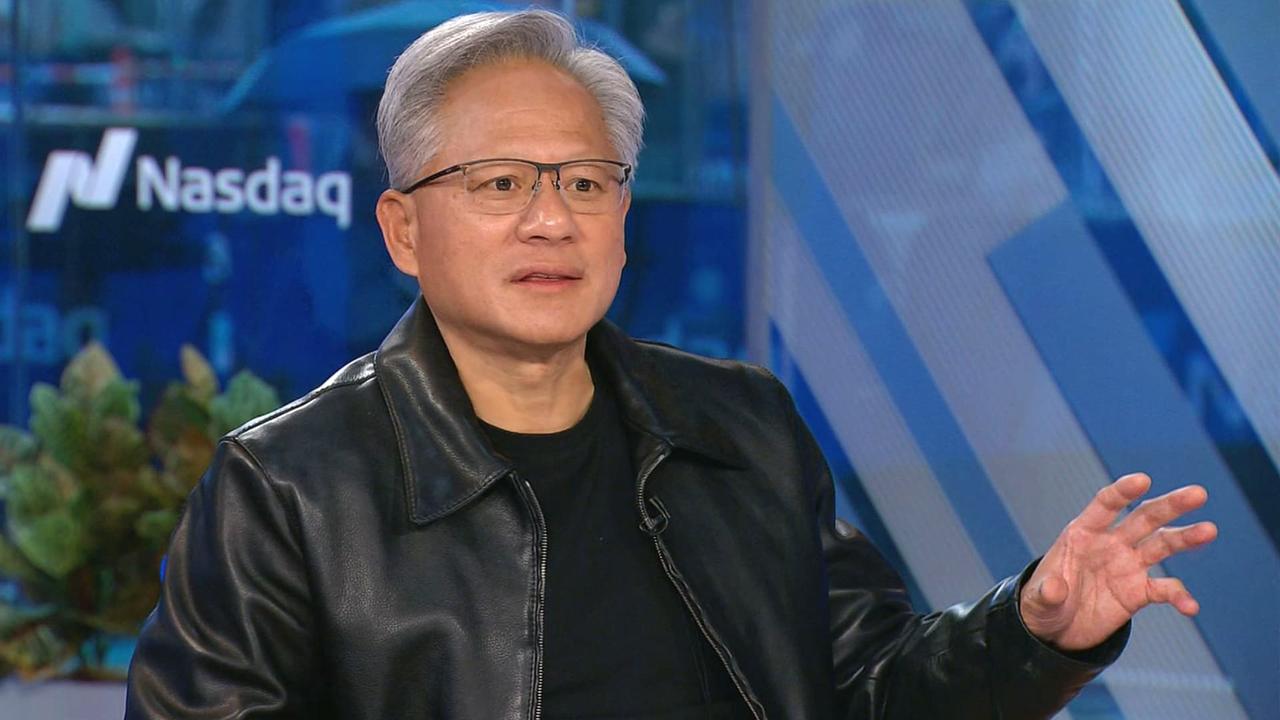Nvidia CEO Jensen Huang Challenges DeepSeek's AI Efficiency Claims, Predicts Surge in Computing Demand
2 Sources
2 Sources
[1]
Nvidia's Jensen Huang on why DeepSeek's new model will need '100 times more computing'
Nvidia CEO Huang: DeepSeek's R1 reasoning AI consumes 100x more compute than non-reasoning AI CEO Jensen Huang discussed the impact of Chinese startup DeepSeek's new artificial intelligence model in a Wednesday interview with CNBC's Jim Cramer at Nvidia's annual GTC conference. Huang asserted that the groundbreaking model will actually require more computation than many in the industry thought. According to Huang, DeepSeek's R1 model is "fantastic" because it is "the first open-sourced reasoning model." He explained that the model breaks down problems step-by-step, is able to come up with different answers, and it can verify whether its answer is correct. "This reasoning AI consumes 100 times more compute than a non-reasoning AI," he said. "It was exactly the opposite, it was the exact opposite conclusion that everybody had." In late January, DeepSeek's model triggered a massive sell-off in AI stocks, as investors feared the model could perform as well as top competitors using less energy and money. Nvidia plummeted 17% in one session to lose close to $600 billion, the largest ever single day drop for a U.S. company. Huang also spoke about some of what his company has revealed so far at its conference, including new AI infrastructure for robotics and for the enterprise, highlighting partnerships with companies like Dell, HPE, Accenture, ServiceNow and CrowdStrike. He reflected broadly on the AI boom, noting the way hype has shifted from purely generative AI to reasoning models. He also predicted that the world's computing capital expenditures seems on track to reach a trillion dollars by the end of the decade, and that the majority of that money will be used for AI. "So, our opportunity as a percentage of a trillion dollars by the end of this decade is, is quite large," Huang said. "We've got a lot of infrastructure to build."
[2]
Nvidia CEO refutes DeepSeek's AI model impact analysis, anticipates increased hardware demand By Investing.com
Investing.com -- Nvidia Corp . (NASDAQ:NVDA), a leading player in the artificial intelligence (AI) sector, has argued that the advent of new AI models capable of generating complex responses will only amplify the demand for computing infrastructure. Jensen Huang, the Chief Executive Officer of Nvidia, addressed concerns raised by Chinese startup DeepSeek regarding their R1 AI model. DeepSeek had suggested that future software advancements could lead to a reduced need for chips and powerful servers. Huang refuted these claims in a meeting with investors at Nvidia's GTC conference in San Jose, California. He stated that the interpretation of the R1 model's impact was entirely incorrect. According to Huang, the computational demands for such advanced AI software are considerably higher than what DeepSeek projected. The Nvidia CEO's statement indicates a potential increase in demand for the company's products, which are integral to the computing infrastructure required by complex AI models. This is in direct contradiction to DeepSeek's prediction of a reduced need for such hardware in the future.
Share
Share
Copy Link
Nvidia CEO Jensen Huang refutes the notion that DeepSeek's new AI model will reduce hardware needs, instead asserting that advanced reasoning AI will require significantly more computing power, potentially boosting demand for Nvidia's products.

Nvidia CEO Challenges DeepSeek's AI Efficiency Claims
In a recent interview at Nvidia's annual GTC conference, CEO Jensen Huang has challenged the notion that DeepSeek's new AI model will lead to reduced hardware requirements. Instead, he argues that advanced AI models will necessitate a significant increase in computing power, potentially driving up demand for Nvidia's products
1
.DeepSeek's R1 Model and Its Impact
DeepSeek, a Chinese startup, recently introduced its R1 model, which Huang described as "fantastic" and "the first open-sourced reasoning model." The model's ability to break down problems step-by-step, generate multiple answers, and verify its own correctness has garnered attention in the AI community
1
.However, contrary to initial market reactions, Huang asserts that this advanced AI will require substantially more computational resources:
"This reasoning AI consumes 100 times more compute than a non-reasoning AI," Huang stated, emphasizing that this conclusion is "exactly the opposite" of what many in the industry had anticipated
1
.Market Implications and Nvidia's Position
The introduction of DeepSeek's model in late January triggered a significant sell-off in AI stocks, with investors fearing that the model could match top competitors' performance while using less energy and money. This led to a massive 17% drop in Nvidia's stock price, resulting in a loss of nearly $600 billion in market value – the largest single-day drop for a U.S. company
1
.Huang's recent statements at the GTC conference aim to counter these concerns and reaffirm Nvidia's strong position in the AI hardware market. He predicts that global computing capital expenditures will reach $1 trillion by the end of the decade, with the majority allocated to AI
1
.Related Stories
Nvidia's Strategic Outlook
During the conference, Huang highlighted Nvidia's new AI infrastructure developments for robotics and enterprise applications. He emphasized partnerships with major tech companies such as Dell, HPE, Accenture, ServiceNow, and CrowdStrike
1
.Addressing investors at the GTC conference in San Jose, California, Huang reiterated his stance on the increased demand for computing infrastructure:
"So, our opportunity as a percentage of a trillion dollars by the end of this decade is quite large," Huang said. "We've got a lot of infrastructure to build."
2
Shifting AI Landscape
Huang also noted the evolving focus in the AI industry, observing a shift from purely generative AI to reasoning models. This transition underscores the increasing complexity of AI applications and the corresponding need for more powerful computing resources
1
.As the AI landscape continues to evolve, Nvidia's stance on the computational requirements for advanced AI models could have significant implications for the future of AI hardware and infrastructure development.
References
Summarized by
Navi
Related Stories
Recent Highlights
1
Samsung unveils Galaxy S26 lineup with Privacy Display tech and expanded AI capabilities
Technology

2
Anthropic refuses Pentagon's ultimatum over AI use in mass surveillance and autonomous weapons
Policy and Regulation

3
AI models deploy nuclear weapons in 95% of war games, raising alarm over military use
Science and Research








